Answer these simple questions and we will find you the BEST prices
Which type of solar quotes do you need?
It only takes 30 seconds
100% free with no obligation

Get Free quotes from insulation specialists near you

Save money by comparing quotes and choosing the most competitive offer

The service is 100% free and with no obligation
- GreenMatch
- Insulation
- Garage Insulation
- Garage Wall Insulation
A Complete Guide to Garage Wall Insulation

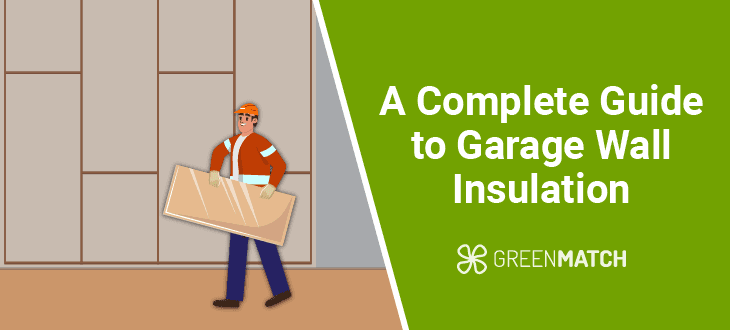
- Uninsulated garage walls can account for up to 33% of heat loss, decreasing thermal efficiency in both your garage and home.
- Garage wall insulation costs on average between £50 and £55 per m2, depending on your choice of materials and installation method.
- To achieve optimal U-value, garage wall insulation is generally recommended to be 50mm to 100mm thick.
Garage insulation is a smart way to make your space more functional and energy-efficient. With over 11 million homes in the UK featuring garages, many of these areas go underutilised due to poor temperature control.
By adding garage wall insulation, you can effectively improve thermal efficiency, especially in the UK, where garages are often built with single-skin brick or block walls. Uninsulated walls can account for up to 33% of a building’s heat loss, making the garage colder and less energy-efficient.
For those of you looking to transform your garage into a comfortable and usable space, garage wall insulation offers a strong barrier against temperature swings, keeping it warm in the winter and cool in the summer. Whether your garage walls are single-skin or double-skin with a cavity, there are insulation solutions that can make this often-overlooked space a valuable extension of your home.
In this guide, we’ll explore types of garage wall insulation, installation methods, and how insulating your garage can boost your home’s overall energy efficiency and comfort year-round.
Ready to take the next step? GreenMatch can help you find the right specialist with ease. Just fill out our 30-second form, and we’ll connect you with up to four free quotes—no hidden costs or obligations. Let us make garage insulation easy and stress-free! Click below to get started.
- Describe your needs
- Get free quotes
- Choose the best offer
It only takes 30 seconds



Benefits of garage wall insulation
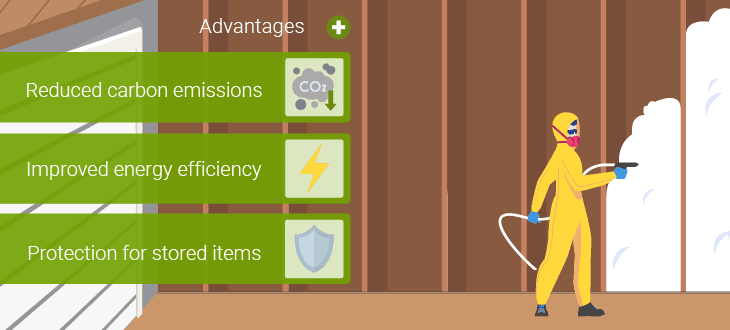
High-quality garage insulation brings many benefits extending beyond the garage to enhance your home. From reducing energy bills to lowering carbon emissions, garage wall insulation offers several advantages:
- Improved energy efficiency: Insulating garage walls greatly reduces heat loss, making it much easier to control temperatures. Insulating garage walls can reduce heat loss by up to 33%. With proper insulation, your garage retains warmth during winter. It prevents excess heat in summer, cutting down on the energy needed to maintain comfortable indoor temperatures.
- Reduce carbon emissions: By reducing the heat needed to warm your garage, especially if attached to your home, garage wall insulation lowers your carbon footprint and promotes a more sustainable, eco-friendly living environment.
- Enhanced comfort: By insulating your garage, you create a more comfortable environment, whether using the space for storage, as a workshop, or as an additional living area. Stable temperatures year-round prevent the space from becoming overly cold or hot.
- Increased home value: Insulating the garage can boost your home’s market value, especially as energy efficiency becomes more desirable to potential buyers. A well-insulated garage adds to your property’s overall appeal and usability.
- Reduced noise transmission: Insulation also acts as a sound barrier, reducing noise transfer between the garage and your home. This is particularly helpful if your garage is near a busy road or if you use it as a workspace or gym.
- Protection for stored items: With proper insulation, items stored in the garage are protected from temperature swings that can lead to moisture buildup, rust, and other types of damage—especially valuable for preserving sensitive or valuable items.
What are the drawbacks?
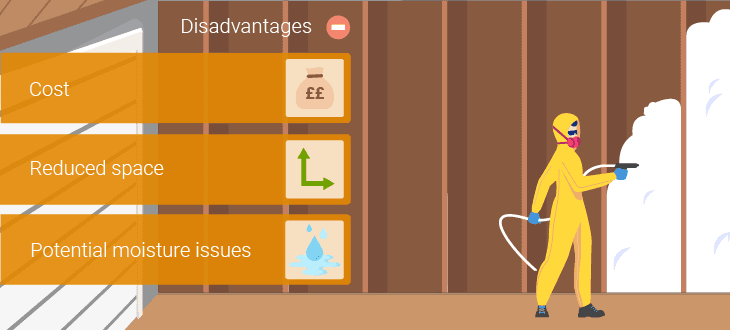
While garage wall insulation offers many benefits, weighing potential drawbacks is essential to make a well-informed choice. Here are some considerations to keep in mind:
- Upfront cost: Garage wall insulation requires an initial investment that varies based on materials and installation. The process may be more complex and expensive for single-skin walls, especially if additional framing is needed to support insulation.
- Reduced space: Adding insulation can take up some interior space, especially if using thick materials or opting for internal wall insulation. This could be a concern in smaller garages where every inch counts.
- Moisture issues: Improper installation can lead to trapped moisture, causing condensation within the walls. This risk is higher in damp climates, making ventilation and vapour barriers essential to prevent mould and mildew that could damage the garage and its contents.
- Limited effectiveness for detached garages: Insulating a detached garage may not provide the same energy efficiency gains as insulating an attached one, as it’s separate from the main living areas. Detached garages often offer a lower cost-benefit ratio due to their reduced impact on household energy use.
- Maintenance and replacement: Some insulation types may degrade over time, diminishing their effectiveness. Polystyrene, for instance, can lose insulating capacity with age, while natural materials like wool may require regular checks for pests or moisture buildup.
To prevent these problems, it's crucial to collaborate with professional installers who can ensure the garage wall insulation is installed accurately and without any issues.
How to insulate a garage wall
Insulating your garage wall is a practical way to improve thermal efficiency, especially in single-skin brick garages, which are common in the UK. Here’s a step-by-step guide to help you insulate your garage walls effectively.
- Rigid foam insulation boards (for direct wall insulation)
- Battens (for batten wall insulation)
- Stud wall framing materials (for stud wall insulation)
- Insulating plaster (optional)
- Vapour barrier
- Plasterboard
- Adhesive (for external wall insulation)
- Reinforcement mesh
- Insulation boards (for external insulation)
- Fixing anchors
- Primer
- Finishing render
- Basic tools (screwdriver, utility knife, hammer)
Step 1: Evaluate your garage wall structure
Identify whether your garage has single-skin or double-skin walls. Single-skin walls don’t have cavities, which limits insulation options to internal or external methods. For double-skin walls, consider consulting a professional to see if blown-in polystyrene insulation can be used in the cavity.
Step 2: Choose insulation method
Internal wall insulation (IWI) is a common and affordable option for garages, especially those attached to the house. Here are the main methods:
- Direct wall insulation: Attach rigid foam boards directly to the interior walls. Seal the joints, add a vapour barrier, and finish with plasterboard. This is ideal for garages with flat walls and minimal damp issues.
- Batten wall insulation: Fix battens to uneven walls, place insulation between them, and finish with plasterboard. This method works well for irregular surfaces, providing a smooth finish.
- Stud wall insulation: Build a secondary wall with a cavity, allowing for thicker insulation and room for wiring or plumbing. While it takes up more space, it offers high thermal performance and is ideal for older or uneven walls.
- Insulating plaster: For a space-saving option, apply insulating plaster directly to the walls. This breathable option prevents dampness but provides less insulation than thicker materials.
External wall insulation (EWI) is another effective option, especially if you want to avoid sacrificing interior space. EWI includes several layers:
- Apply an adhesive layer to bond insulation panels securely to the outer wall.
- Attach the core insulation board for thermal efficiency.
- Reinforce with a mesh layer for durability.
- Add a primer to waterproof the insulation.
- Finish with a render to protect against weather and add a decorative touch.
Step 3: Install ventilation
Proper ventilation is critical to prevent moisture build-up, particularly with EWI, as it reduces natural air exchange. Install vents or other ventilation solutions as needed to ensure a moisture-free environment.
Step 4: Inspect and finish
Check that all layers are securely installed, and inspect for any gaps or areas needing touch-ups. Seal everything and finish with plasterboard or a render, depending on your chosen method.
Although DIY garage wall insulation can save you money on labour costs can lead to errors like inadequate sealing, which causes air leaks, and improper vapour barrier insulation installation, resulting in moisture buildup and potential mould issues. Hiring a professional installer ensures the job meets building standards, reducing the risks of heat loss and long-term damage for a safer, more effective result.
Garage wall insulation thickness
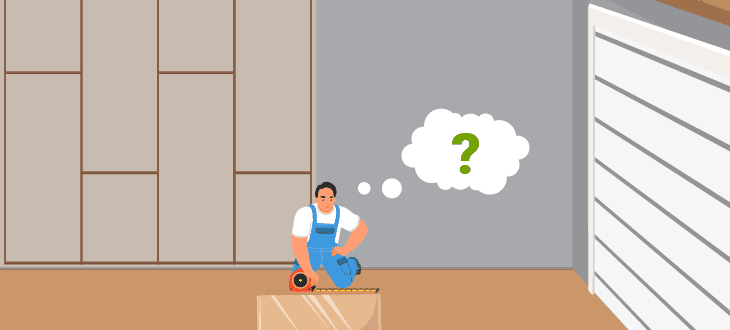
The thickness of garage wall insulation depends on the wall type, insulation material, and specific U-value requirements set by building regulations insulation. These regulations, in Approved Documents L for England and Wales and similar standards in Scotland, set U-value targets that vary depending on whether the garage is converted into a heated or unheated space.
England and Wales: For heated garages, walls should ideally reach a U-value of 0.18 W/m2K. If achieving this would reduce the floor area by over 5%, a higher U-value is allowed. For renovations covering 50% or more of a wall’s surface, a U-value of 0.30 W/m2K (internal or external insulation) or 0.55 W/m2K (cavity insulation) is recommended.
Scotland: Converted garages for living spaces should target a U-value of 0.17 W/m2K, though up to 0.70 W/m2K is acceptable if structural limits apply.
Typically to meet these required U-values in the UK, insulation thickness should be between 50mm to 100mm but this depends on the material and its R-value. For cavity walls, blown polystyrene can often fill the gap. Single-skin or solid walls require internal wall insulation (IWI) or external wall insulation (EWI), with IWI adding thickness inside and EWI applied externally under a render.
If you’re unsure about the right insulation thickness for your garage walls to meet building regulations, working with an insulation specialist is essential. At GreenMatch, we can connect you with up to four free quotes from top insulation experts in your area, with no hidden costs or obligations. Just fill out our quick, 30-second form to receive your quotes. Click below to get started!
- Describe your needs
- Get free quotes
- Choose the best offer
It only takes 30 seconds



How much does garage wall insulation cost?
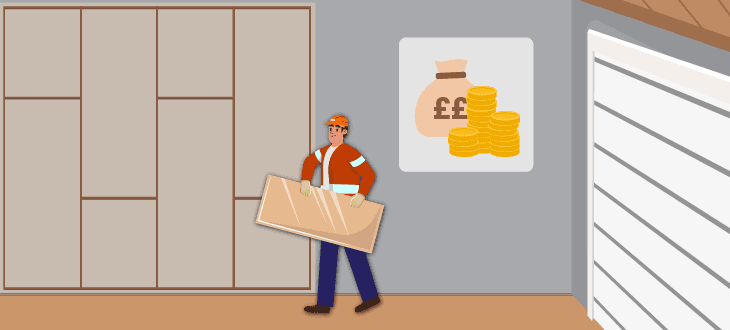
Garage wall insulation is typically one of the more expensive ways to insulate your garage. On average, the cost to insulate a garage fully is around £35 to £45 per m2, while garage wall insulation alone generally costs between £50 and £55 per m2, depending on your chosen materials and insulation method. Here’s a quick breakdown of material costs for garage wall insulation:
| Material | Cost per m2 |
|---|---|
| Fibreglass | £10 |
| Rigid foam boards | £10 to £21.50 |
| Cellulose | £11 |
| Sheep wool | £19.75 |
| Spray foam | £21.50 or more |
If wall insulation is beyond your budget, consider other options like garage floor insulation, which is one of the most affordable methods at around £40 per m2. However, it may not provide the same thermal efficiency as wall insulation. Another effective option is garage roof insulation, costing about £40 to £50 per m2, which can reduce heat loss by up to 25%. Exploring different areas to insulate within your garage can help you find the most cost-effective approach to improve energy efficiency.
What insulation is best for garage walls?

Choosing the right insulation for your garage walls depends on your needs, budget, and the wall type, especially if you’re considering garage conversion insulation to make the space more liveable. Here’s a look at some of the best options:
- Rigid foam boards: These are popular for garages because they offer high thermal resistance (R-value) in a thin layer, making them ideal for space-saving. They are easy to install and moisture-resistant, making them perfect for direct wall applications.
- Spray foam: Spray foam provides excellent thermal performance, sealing gaps effectively to reduce air leakage. It’s highly durable and works well on irregular surfaces but can be more expensive.
- Fibreglass: Fibreglass insulation is a budget-friendly option in rolls or batts. Though it has a lower R-value per inch than foam, it still offers decent insulation, mainly when used with vapour barriers.
- Sheep wool: Sheep wool insulation is an excellent natural insulator with moisture-regulating properties for those looking for a sustainable insulation option. However, it may be pricier than synthetic materials.
- Cellulose: Made from recycled paper, cellulose insulation is eco-friendly and effective for cavity-filled applications. It also offers soundproofing benefits, but it may need professional installation to ensure proper coverage.
Each insulation type offers unique benefits, so it’s wise to consult with a professional installer to determine the best fit for your garage structure and climate. At GreenMatch, we can connect you with up to four free quotes from top insulation specialists in your area. Just fill out our quick 30-second form to get started!
- Describe your needs
- Get free quotes
- Choose the best offer
It only takes 30 seconds



FAQ
The best insulation for garage walls depends on your needs and budget, with popular choices including rigid foam boards for space-saving efficiency, spray foam for maximum thermal performance, and fibreglass for affordability.
Yes, insulating garage walls significantly improves temperature control, energy efficiency, and comfort, making the space more usable year-round.
To insulate garage walls in the UK, choose the right insulation type (such as rigid foam boards, fibreglass, or spray foam), apply it to either the internal or external wall surface, and ensure proper vapour barriers and ventilation to prevent moisture build-up.
The thickness of garage wall insulation depends on the insulation type and UK building regulations, but typically ranges from 50mm to 100mm to meet required U-values for energy efficiency.

Caoimhe is an experienced content writer and researcher who is passionate about providing accessible information to every reader. With a background in English literature and Sociology, she combines the two disciplines to create cohesive, well-thought-out, and well-informed pieces.
We strive to connect our customers with the right product and supplier. Would you like to be part of GreenMatch?

